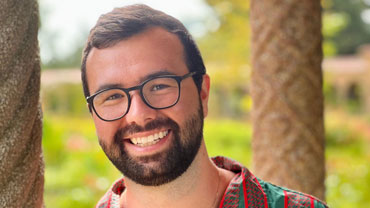
- Name, job title, and location: Ryan Zohar, Middle East Studies Liaison and Reference Librarian. Most of the time, you can find me on the 3rd floor of Lauinger Library, but you can occasionally find me holding office hours at the Center for Contemporary Arab Studies (CCAS) and elsewhere on campus.
- What do you do—in 10 words or less? Build collections, support research, and connect users with the Library.
- Where are you from? New York, and if you speak to me for more than a few minutes, you will almost certainly realize the amount of love I have for it.
- Do you have any hobbies? I really enjoy music, running, and exploring DC and its surroundings. I am also interested in translation and maintain a modest collection of rare and out-of-print books related to Middle East Jewish history.
- What are you reading/watching/playing/listening to/learning right now? Right now, I am reading Stephen L. Harp's The Riviera, Exposed: An Ecohistory of Postwar Tourism and North African Labor. I spent my first two years of undergrad on the Riviera, studying the Middle East and North Africa. When the book came out this year, I jumped at the opportunity to learn about the lesser-known history of labor and environmental racism in a place I have come to hold as deeply important. Beyond that, I am currently watching the hilarious Derry Girls and re-listening to Third Eye Blind’s eponymous 1997 debut album.
- What are your favorite fall activities? I won’t knock the typical fall favorites like apple picking or queuing up for a drink with even the slightest hint of pumpkin or cinnamon. Still, I am equally happy to spend my days in parks among the fallen leaves, go on hikes, or just take stock of all the beautiful colors.
- What's your superhero/hidden talent? Lately, I’ve been getting a bit too invested in guessing the daily Heardle in two tries or less.
- Is there anything from the past that you wish would come back into fashion? Without a doubt, I’d choose the beautiful article of clothing that is oft-maligned as the “ugly” sweater. With fall now in full swing, it’s practically my uniform.
- What attracted you to Middle East studies? There is more than one way I could answer this question. Above all, I would say that it was a way for me to engage with the region’s history—and my own family’s place in it—beyond the flattened narratives one frequently encounters growing up in the U.S. While I am interested in the literature and languages of the region, in particular, I think the questions I gravitate towards—about memory, the circulation of ideas, and material culture—are ones familiar to scholars focusing on all regions of the world. While the term “area studies” makes us think of separate and disparate geographic spheres, the reality is that these areas have never at all been hermetically sealed and that sources for the field have always been interdisciplinary, intertextual, and multilingual.
- If you didn’t work in your current field, what would you be doing? Since undergrad, I knew I wanted to do something linked to research and higher education. First, I thought I would enroll in a Ph.D. program. Then, I ended up working in program administration for a nonprofit research organization. I liked this because, like librarianship, it allowed me to have both a focus on research and scholarship, but also ensured I would do this with a practitioner’s bent. Had I not gone the library route, I think I might have stayed in the nonprofit world.
